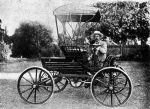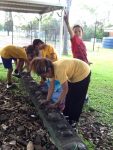This week our youngest students are looking in depth at different types of celebrations; slightly older students are examining how people got around in the ‘Olden Days’; and our older primary students have some extra time to finish their activities from last week.
Foundation to Year 3

In the stand-alone Foundation (Prep) unit (F.1), students are discussing celebrations – which ones do we recognise in Australia, how these compare with celebrations overseas, and what were these celebrations like in days gone by. Our integrated Foundation (Prep) unit (F.5) and students in Years 1 (1.1), 2 (2.1) and 3 (3.1), are examining Transport in the Past – how did their grandparents get around? How did people get around 100 years ago? How did kids get to school? How did people do the shopping? Students even get to dream about how we might get around in the future…
Years 3 to 6

At OpenSTEM we recognise that good activities, which engage students and allow for real learning, take time. Nobody likes to get really excited about something and then be rushed through it and quickly moved on to something else. This part of the unit has lots of hands-on activities for Year 3 (3.5) students in an integrated class with Year 4, as well as Year 4 (4.1), 5 (5.1) and 6 (6.1) students. In recognition of that, two weeks are allowed for the students to really get into making Ice Ages and mud bricks, and working out how to survive the challenges of living in a Neolithic village – including how to trade, count and write. Having enough time allows for consolidation of learning, as well as allowing teachers to potentially split the class into different groups engaged in different activities, and then rotate the groups through the activities over a 2 week period.

Since implementing this program I've really noticed how the students are improving.
Trent Perry, Teacher